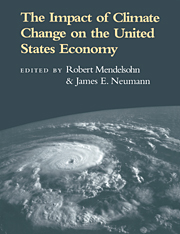Book contents
- Frontmatter
- Contents
- List of Contributors
- Acknowledgements
- 1 Introduction
- 2 Economic effects of climate change on US agriculture
- 3 The impact of climate variation on US agriculture
- 4 Climate change and agriculture: the role of farmer adaptation
- 5 The impacts of climate change on the US timber market
- 6 Economic effects of climate change on US water resources
- 7 The economic damage induced by sea level rise in the United States
- 8 The impact of global warming on US energy expenditures
- 9 The economic impact of climate change on the US commercial fishing industry
- Introduction to recreation
- 10 The impact of climate change on outdoor recreation
- 11 Estimated effects of climate change on selected outdoor recreation activities in the United States
- 12 Synthesis and conclusions
10 - The impact of climate change on outdoor recreation
Published online by Cambridge University Press: 21 October 2009
- Frontmatter
- Contents
- List of Contributors
- Acknowledgements
- 1 Introduction
- 2 Economic effects of climate change on US agriculture
- 3 The impact of climate variation on US agriculture
- 4 Climate change and agriculture: the role of farmer adaptation
- 5 The impacts of climate change on the US timber market
- 6 Economic effects of climate change on US water resources
- 7 The economic damage induced by sea level rise in the United States
- 8 The impact of global warming on US energy expenditures
- 9 The economic impact of climate change on the US commercial fishing industry
- Introduction to recreation
- 10 The impact of climate change on outdoor recreation
- 11 Estimated effects of climate change on selected outdoor recreation activities in the United States
- 12 Synthesis and conclusions
Summary
This study estimates the impact of climate change on the demand for outdoor recreation. The study expands on earlier literature, which only studied skiing, by including analysis of six summer activities. The demand for each activity is estimated by regressing climate and other control variables for each state in the continental United States, using both linear and loglinear functional forms.
The estimated climate relationships are used to forecast the welfare impact of nine alternative climate change scenarios in both 1990 and 2060. With the inclusion of summer activities, the overall net effect of warming is beneficial. An increase in temperature of 2.5°C and precipitation by 7 percent generates overall net recreation benefits of $2.8 billion (+7 percent) with the linear model and $4.1 billion (+9 percent) with the loglinear demand model. If temperatures increase by 5°C, net benefits jump to $25.9 billion (+63 percent) with the linear model and $18.9 billion (+40 percent) with the loglinear model. Both models predict large fishing benefits from warming and substantial skiing losses. The linear model also predicts sizable boating benefits and camping and wildlife viewing losses. The higher per capita income in 2060 results in substantially smaller 2060 versus 1990 benefits according to the loglinear model because hunting benefits shrink and skiing damages increase. The results for the linear model are approximately the same in 1990 and 2060.
- Type
- Chapter
- Information
- The Impact of Climate Change on the United States Economy , pp. 267 - 288Publisher: Cambridge University PressPrint publication year: 1999
- 20
- Cited by



